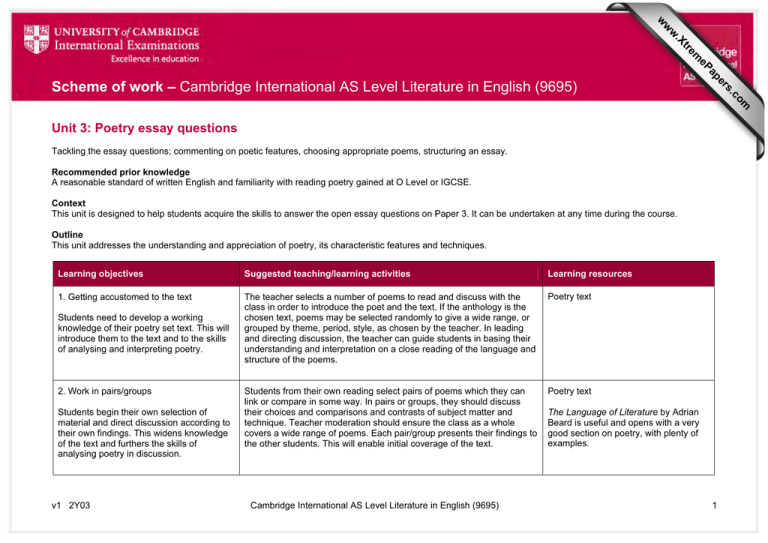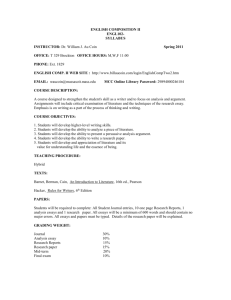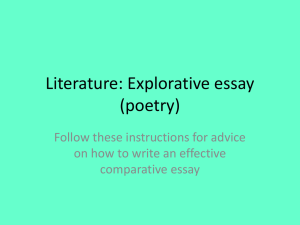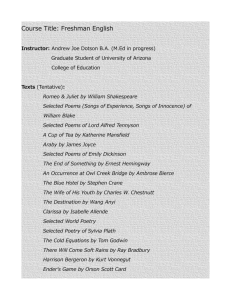Scheme of work – Cambridge International AS Level Literature in... Unit 3: Poetry essay questions www.XtremePapers.com
advertisement

om .c s er ap eP m e tr .X w w w Scheme of work – Cambridge International AS Level Literature in English (9695) Unit 3: Poetry essay questions Tackling the essay questions; commenting on poetic features, choosing appropriate poems, structuring an essay. Recommended prior knowledge A reasonable standard of written English and familiarity with reading poetry gained at O Level or IGCSE. Context This unit is designed to help students acquire the skills to answer the open essay questions on Paper 3. It can be undertaken at any time during the course. Outline This unit addresses the understanding and appreciation of poetry, its characteristic features and techniques. Learning objectives Suggested teaching/learning activities Learning resources 1. Getting accustomed to the text The teacher selects a number of poems to read and discuss with the class in order to introduce the poet and the text. If the anthology is the chosen text, poems may be selected randomly to give a wide range, or grouped by theme, period, style, as chosen by the teacher. In leading and directing discussion, the teacher can guide students in basing their understanding and interpretation on a close reading of the language and structure of the poems. Poetry text Students from their own reading select pairs of poems which they can link or compare in some way. In pairs or groups, they should discuss their choices and comparisons and contrasts of subject matter and technique. Teacher moderation should ensure the class as a whole covers a wide range of poems. Each pair/group presents their findings to the other students. This will enable initial coverage of the text. Poetry text Students need to develop a working knowledge of their poetry set text. This will introduce them to the text and to the skills of analysing and interpreting poetry. 2. Work in pairs/groups Students begin their own selection of material and direct discussion according to their own findings. This widens knowledge of the text and furthers the skills of analysing poetry in discussion. v1 2Y03 Cambridge International AS Level Literature in English (9695) The Language of Literature by Adrian Beard is useful and opens with a very good section on poetry, with plenty of examples. 1 Learning objectives Suggested teaching/learning activities Learning resources 3. Developing a broader understanding From the earlier discussions, the students should now have a general overview of some of the key features, methods and concerns within the set text. They should gather these ideas and present them on a board or flipchart. As well as subject matter and theme, students should be encouraged to consider such things as Point of View, Tone, Shape/Pattern and Imagery. Poetry text Students broaden their knowledge of the text, developing from earlier discussion, and recognise the key concerns and poetic methods apparent in the chosen text. Students should then be able to from links between poems or group them according to categories of content and style. They will find that the same poem can be placed in several groups, and this in itself should prompt discussion. If presented visually as a poster, this can usefully be left on the classroom wall for reference. 4. Preparing to write essays On a foundation of knowledge and experience of the text, students can build towards writing essays on the poetry. 5. Writing exam-style essays This prepares students for the type of question they will face for the open essay in the examination (the a) question). As an initial writing exercise before tackling examination-type questions, students should choose two or three poems which they can group or link and write a piece about what they find to compare or contrast in them. They should be encouraged to consider how the poet’s chosen language, imagery and form creates a particular impact in each poem. The resulting pieces of writing should be shared among the group in order to exchange ideas between students. Poetry text The open questions (always the a option) frequently use words such as ‘Discuss’, ‘Compare’, ‘Examine’ or ‘Comment’, which instruct the candidate what to do in the essay. An alternative form is to present a view of the text and ask the candidate ‘How far do you agree?’ In this case, candidates should reach a conclusion in their essay. The teacher should discuss the implications of these types of questions with the students. Past papers for syllabus 9695 available from the Cambridge Teacher Support website at http://teachers.cie.org.uk From earlier discussions, students should be aware of what features they are expected to ‘comment’ on, ‘explore’ or ‘discuss’. They should be prepared to consider Point of View, Tone, Shape/Pattern (to include stanza form, rhyme and rhythm) Language (diction, or semantic field) and Imagery, in each case considering how these affect the communication of the subject/meaning of the poems. They are now prepared to attempt their first examination style essay question. v1 2Y03 Cambridge International AS Level Literature in English (9695) 2








